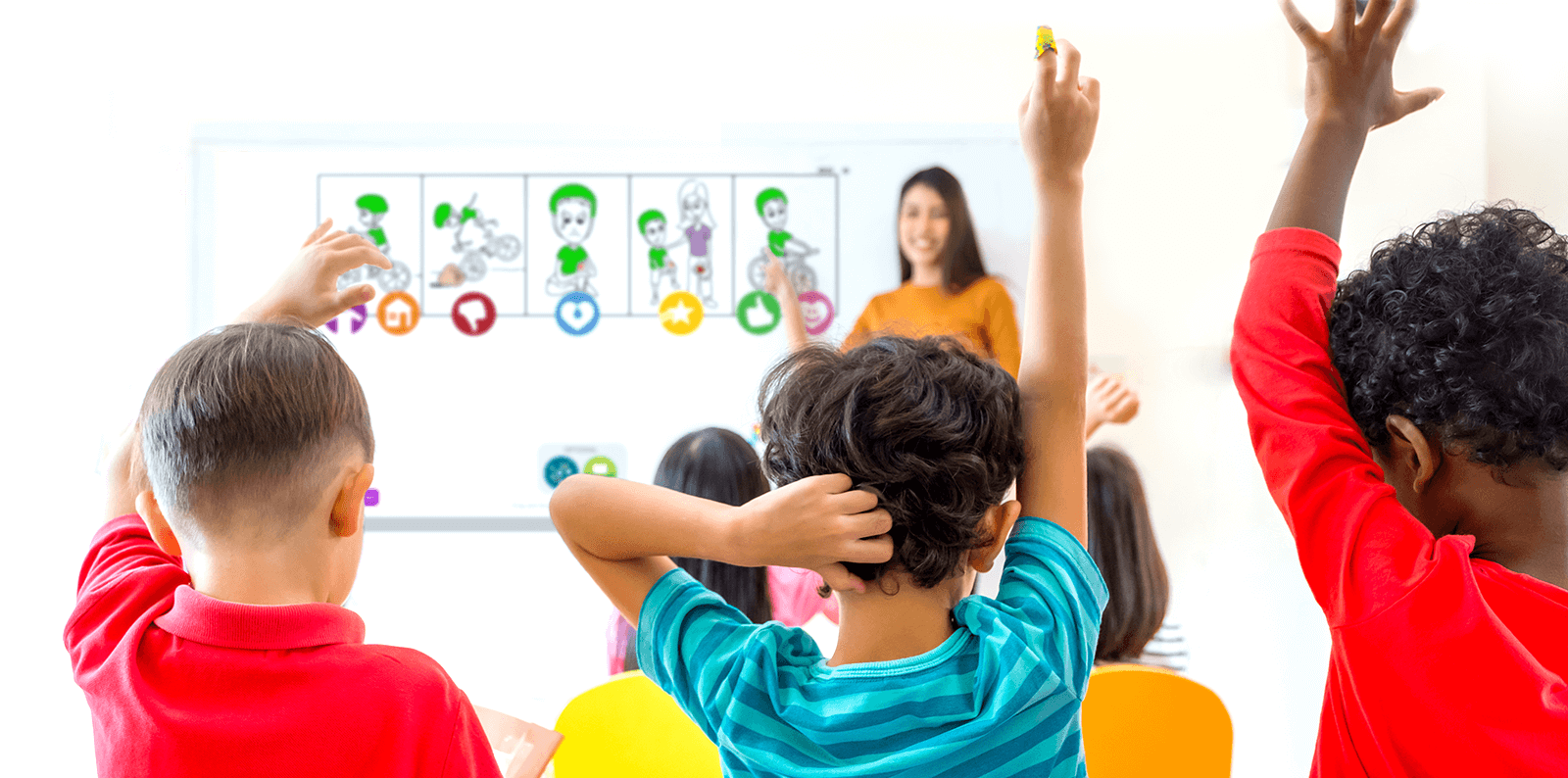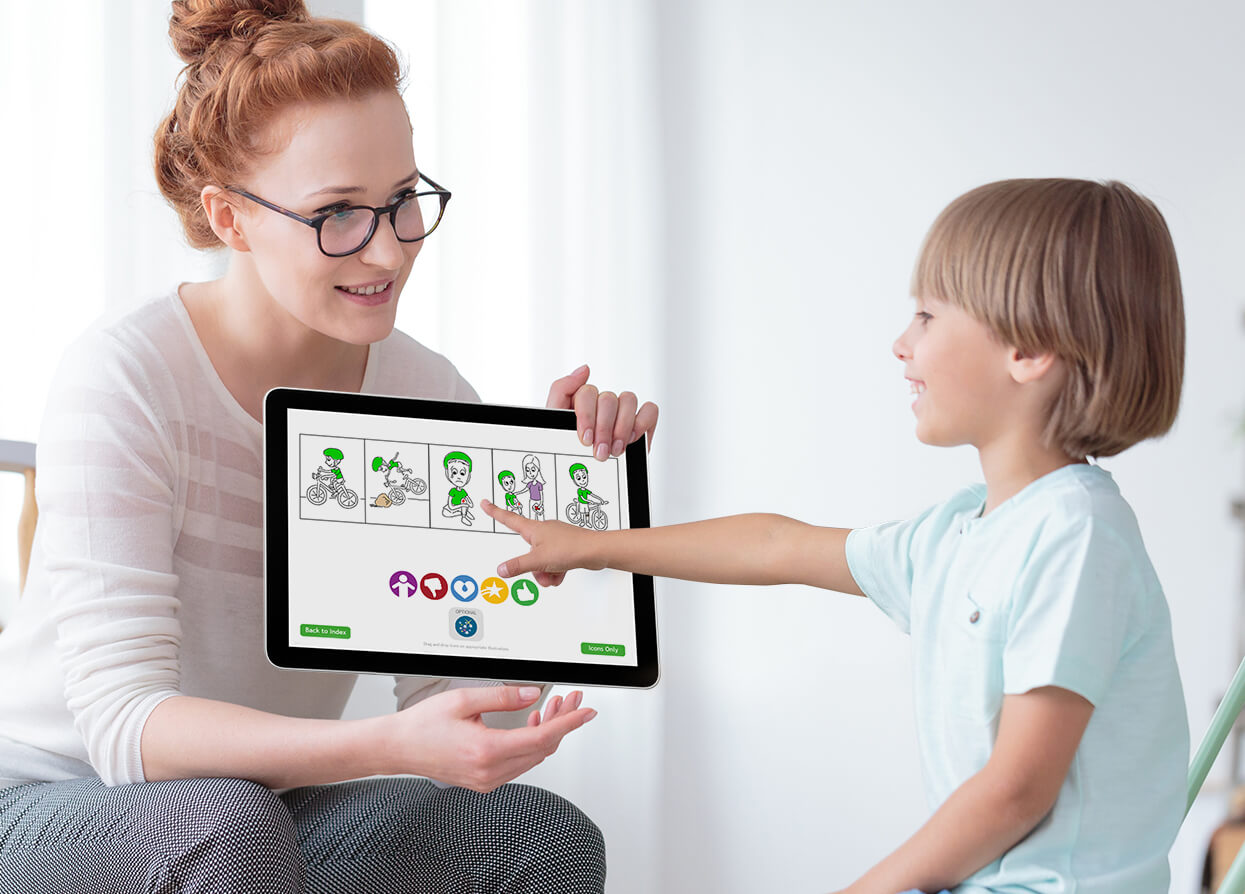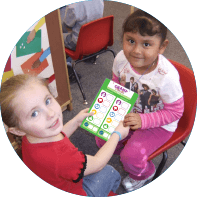What is Story Champs®?
Story Champs® (available in both English and bilingual English/Spanish) is a multi-tiered language program that helps educators and clinicians promote academic language of diverse students. Story Champs® is a semi-manualized program with explicit teaching procedures, but it is also extremely flexible to allow for sensible differentiation. Although the primary focus of Story Champs® is on the development of a strong oral language foundation through storytelling, it also promotes other aspects of academic language that are essential for school success through information retelling, vocabulary learning, and writing.
Why Story Champs?
Strong academic oral language is critical for bolstering students’ success in school. Most state educational standards (e.g., Common Core State Standards) include objectives for speaking and listening in addition to reading and writing. These language-based skills are highly interrelated and essential for academic success. Students who do not have an adequate oral language foundation have considerable difficulty meeting academic expectations. Story Champs was developed to systematically and explicitly promote oral language as the foundation to success in school.
In Story Champs, academic language is fostered primarily through listening to and producing oral narratives (stories), but informational discourse is also addressed. The organizational structures and complexity of the language used in narratives and informational discourse reflect the sophistication of language that students must read and write in school. Strengthening academic language via oral narratives can facilitate growth in other academic skills such as recalling and sharing information, acquiring word meanings through context, expanding domain knowledge, producing more advanced writing, and comprehending text.

Whether you are teaching in-person or virtually, use Story Champs as your evidence-based language intervention curriculum!

Skills Developed Through Story Champs
• Listening comprehension
• Reading comprehension
• Answering questions about stories and information
• Vocabulary
• Learning vocabulary from context
• Complex syntax
• Oral narrative retelling
• Oral narrative personal generation
• Oral narrative fictional generation
• Written narrative retelling
• Written narrative personal generation
• Written narrative fictional generation
• Information oral retelling
• Information writing
• Domain knowledge
• Problem solving
• Social and emotional aptitude
• Memory
Multi-tiered for large group, small group, and for individual instruction
Story Champs was designed to be a multitiered program so that it is easy to use within Multi-Tiered Systems of Support (MTSS) or Response to Intervention (RTI) models. Story Champs lessons can be implemented in various arrangements, including large groups, small groups, and with individual students. Each lesson lasts 15-45 minutes, depending on the arrangement and language needs of the student(s). The advantage of aligned tiers is that students with greater language needs receive more intensive intervention whereas students with fewer needs participate in a low dose intervention that is sufficient to support their academic language development. Importantly, the curriculum adheres to the same principles and instructional approaches across all tiers so students who move between the tiers are not confused by conflicting approaches.

Who should use Story Champs?
Story Champs was designed for school teams comprised of general and special educators to use within RTI or MTSS frameworks, but it is useful even if a school or clinic does not follow a tiered model. Ideally, a classroom teacher uses the large group lessons while a special educator (e.g., speech-language pathologist, special education teacher), literacy specialist, or paraeducator delivers small group or individual lessons. Because Story Champs is very easy to learn and easy to implement, just about anyone can learn to use it effectively. To ensure fidelity and adherence to the active ingredients, users should read this manual carefully and watch the demonstration videos at www.languagedynamicsgroup.com before delivering lessons to students. It is essential that all users carefully follow the procedural steps outlined in the Master Lesson Plans so that key elements are not omitted unintentionally.
Which students can benefit from Story Champs?
 The simple answer is ALL STUDENTS may benefit from explicit oral language instruction. In most schools today, there is very little emphasis on academic language, so even typically developing students with average language skills could benefit from an increased focus on the academic facets of language. However, Story Champs is clearly vital for students who are at risk for academic failure, including students with disabilities or students who have a mismatch between home and school language, dialect, or culture (e.g., English language learners). Given that Story Champs is a multi-tiered curriculum, the lessons can be differentiated for any student or group of students. Almost two thirds of students are not meeting the academic reading standards in schools. Story Champs, with its accompanying principles of language instruction that are generalizable across the curriculum, gives these students the boost in academic language they need to succeed.
The simple answer is ALL STUDENTS may benefit from explicit oral language instruction. In most schools today, there is very little emphasis on academic language, so even typically developing students with average language skills could benefit from an increased focus on the academic facets of language. However, Story Champs is clearly vital for students who are at risk for academic failure, including students with disabilities or students who have a mismatch between home and school language, dialect, or culture (e.g., English language learners). Given that Story Champs is a multi-tiered curriculum, the lessons can be differentiated for any student or group of students. Almost two thirds of students are not meeting the academic reading standards in schools. Story Champs, with its accompanying principles of language instruction that are generalizable across the curriculum, gives these students the boost in academic language they need to succeed.
Is Story Champs a research based program?
Yes! The development of Story Champs has spanned over 14 years and has included over 39 feasibility and experimental studies. The initial program design was grounded in research-based principles such as frequent opportunities to respond, systematic scaffolding, and immediate corrective feedback. After the initial design, the developers followed an iterative framework for designing, researching, and revising Story Champs and its components. Each of the tiers (large group, small group, individual) have been studied separately and as an integrated multi-tiered system. The effects of Story Champs has been documented with preschoolers and K-3 students in several states, and with typically developing students, students who are at risk, and students with disabilities. Outcomes have included improved story retelling, personal story generation, fictional story generation, story comprehension, acquisition of targeted vocabulary, inferential word learning, story writing, information retelling, and reading comprehension. During the evolution of this research base, the developers, research assistants, clinicians, teachers, and paraeducators have delivered the interventions, and the effects have consistently been strong. In many studies, the dose of Story Champs intervention was small (e.g., only two times per week for ten weeks), suggesting that this is a powerful intervention capable of producing robust effects in a short amount time.
